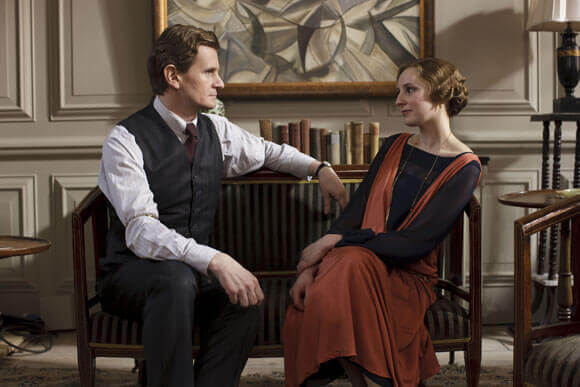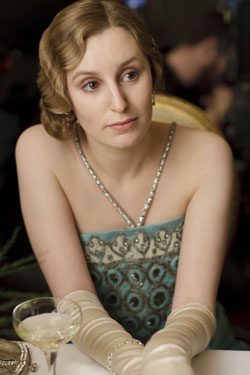
Season four of the critically acclaimed drama series Downton Abbey finally arrives in the U.S. on January 5, 2014, airing an expanded two-hour episode one at 9:00pm on PBS. The series picks up six months after the tragic events of the season three finale, with this season covering February 1922 into the summer of 1923. Lady Mary’s still in mourning, plus the family is still grieving over the death of Sybil, leaving two widowed single parents (Lady Mary and Sybil’s husband, Tom) to face the future and to figure out if they want to become involved in other romantic relationships.
The Roaring ’20s have arrived, Downton’s financial future is still undetermined, and scandals will erupt to cause turmoil among the upstairs and downstairs residents.
During a press tour in 2013, Laura Carmichael (Lady Edith Crawley) talked about what’s in store for fans of the series and how her character’s has evolved over the seasons.
Is Edith actually still working as a journalist this season, or is she just dating her editor? And if so, what will she be writing about? What are her causes?
Laura Carmichael: “Well, yes, she is still involved with the paper and it is a lot more complicated than that, which I’ll just have to let you see without giving too much away, as ever. But the death of Matthew really affects the whole family so when we start, she hasn’t seen Michael Gregson for some time due to the fact that the family is in mourning. So when we come back to the house, she’s seeing Michael for the first time, which is, you know, a lovely scene that’s in the first episode. She’s still sort of turning in some articles. And we know that she’s been writing about the sort of cause of the soldiers, but it’s a kind of modern woman thing. I like to think of her as the Carrie Bradshaw of the ’20s.”
It has sometimes seemed like if Edith is ill-treated by another faithless jerk-face somebody should maybe buy her a book. Do you feel like that is kind of an eternal characteristic of Edith? Is there any hope that Edith might turn this around at some point and stop being in this position perhaps?
Laura Carmichael: “I know! I mean, it’s a tricky thing. Julian [Fellowes] has this take that some people in life are lucky and some people aren’t, and Edith is definitely one of those unlucky people. But I mean, I love the Gregson and Edith relationship because he seems so different from any of the other men in Downton. He’s kind of a working, modern man, a kind of self-made man, and exists in a different universe in London. So their relationship is interesting and, I think, different to any of the others.”

Laura, it seems as though the more confidence you get as your character, the more beautiful you become. Can you talk about the transformation coming from within?
Laura Carmichael: “Well, that’s very nice. I don’t really know how to comment. I guess that’s true. I mean, I know whenever they got me dressed in the first series, they always said, ‘You look lovely.’ You know, I always trusted them. But it definitely feels like, because she’s gone on a real journey and she’s definitely going to London more and seeing kind of the new trends, so Caroline McCall has really gone to town with Edith. I mean, in the last series a bit, but really in this one, it’s some really great costumes.”
This is a show that you never know going from one episode to the other, it could be the next day or it could be six months later or two years later in the early seasons. What was your reaction when you were getting those scripts and you’re developing one storyline, and then it could be very different down the line?
Laura Carmichael: “I like to think of that time in between and how it would have moved on in a way that we haven’t witnessed, you know, which is always really important in the relationships. You know, how you would be naturally closer if you’d known someone for a particular [time], thinking about things like the relationship with Gregson, how long I’ve known him and things. But I think that’s part of your job to kind of hold on to that and work on that. And then it means that we are able to show the era change in the way that we did it, that we were able to do the pre-war and the war.
I mean, certainly for Edith, the war was so part of her moving from bratty child, middle sister, to someone finding a voice. So it has given us the opportunity to show those changes, which is great, and really show those relationships and characters develop.”
One of the themes this season is going to be grief, mourning, recovery, but can you give us any idea of some other themes that are being explored this season?
Laura Carmichael: “I think it feels more in the ’20s. I mean, Edith goes to London a lot and we see the streets of London and Lily James’ character, Rose, is another sort of bright young thing, a character who is kind of having a lot of fun at Downton. So in amongst the mourning, there are these sort of escape scenes for a couple of the characters. And having seen just the first episode and the third episode, they do feel like these moments of escape from the mourning, and I think it works beautifully. So I think, yeah, it will feel in a different era. ”
Have you done much personal research into this time and period?
Laura Carmichael: “[Historical advisor Alastair Bruce] is amazing. He does make our lives so much easier because he’s there all the time, correcting our posture and giving us insights into what we would have felt about this, that, and the other. And, yet, the second series was a time for us all to do quite a lot of research. I think about the war effort and things, and so that was something that we could look into.”
– Also of Interest: Michelle Dockery Interview






